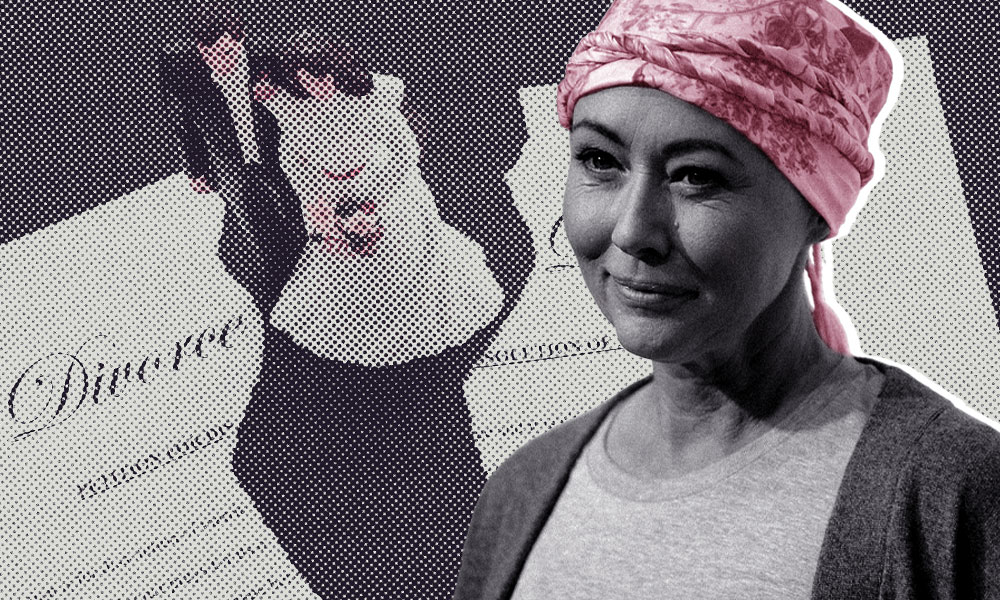Actress Shannen Doherty made one last critical decision in the hours before cancer claimed her life: finalizing her divorce. This 11th-hour legal maneuver wasn't about emotional closure — it was a calculated strategy to protect her $6 million estate from California's community property laws, according to media reports. Her race against mortality reveals a hidden danger lurking in every divorce: the devastating consequences of leaving your estate plan unchanged when relationships crumble.
While most divorcing couples focus on dividing assets and dealing with emotional turbulence, they remain blind to a ticking time bomb within their outdated wills, trusts and beneficiary designations. The wrong name on the right estate planning document could redirect your life's work to an ex-spouse, against your deepest wishes — and once you're gone, there's no opportunity for correction. Doherty's dramatic final act offers a lesson in what's truly at stake when marriages end and mortality looms.
Why is estate planning during divorce so critical?

When marriages end, estate plans designed for couples suddenly become outdated and potentially harmful to your financial interests. Without prompt updates, your soon-to-be ex-spouse may remain the primary beneficiary of your assets or retain decision-making authority over your healthcare and finances. This misalignment between your current wishes and outdated legal documents can lead to unintended consequences that may be impossible to rectify after death or incapacity.
Doherty's situation exemplifies these stakes. By finalizing her divorce just before her passing in July 2024, the former star on TV’s “Beverly Hills, 90210,” "Charmed” and the movie “Heathers,” ensured her Malibu home and residual income from acting would bypass California's community property laws, which might otherwise have granted her ex-husband, Kurt Iswarienko, substantial claims to her estate. This timing proved pivotal in protecting her legacy and directing assets according to her wishes rather than default marital property laws.
What happens to your estate plan when you file for divorce?
Filing for divorce does not automatically invalidate or update your estate planning documents. Until your divorce is finalized:
- Your spouse likely remains the primary beneficiary of your will.
- Life insurance policies and retirement accounts continue listing your spouse as the beneficiary.
- Health care directives and powers of attorney may still grant your spouse decision-making authority.
- Joint accounts remain accessible to both parties.
This legal limbo creates significant vulnerability. Should you pass away during proceedings, your estranged spouse could inherit substantial assets contrary to your current intentions. In community property states like California, Arizona, Idaho, Louisiana, Nevada, New Mexico, Texas, Washington and Wisconsin, the situation becomes even more complex as assets acquired during marriage are typically considered jointly owned.
Can your ex-spouse still inherit your assets?

One of the most dangerous assumptions during divorce is that separation automatically removes your spouse from inheritance considerations. In reality, until your divorce is finalized and estate documents are updated, your spouse may remain positioned to inherit significant portions of your estate.
Even after divorce, outdated beneficiary designations on retirement accounts, life insurance policies and transfer-on-death accounts can override your will's provisions. Federal law governs many retirement accounts like 401(k)s, where beneficiary designations take precedence regardless of divorce decree or will provisions.
Who makes health care decisions if you become incapacitated?
If your ex-spouse remains your health care proxy, they could retain authority to make critical medical decisions if you become incapacitated. Similarly, financial powers of attorney could grant them continued control over your assets during incapacity. Doherty's swift updates prevented this scenario, but many divorcing individuals overlook these crucial documents.
What happens to digital assets and intellectual property?
Modern estate planning must address digital assets — cryptocurrency, online accounts and intellectual property like royalties or residuals. Without updated passwords or clear inheritance instructions, families risk losing access to valuable or sentimental digital property. For individuals with intellectual property rights like Doherty's acting residuals, specific provisions are necessary to ensure proper management and distribution.


How does timing impact estate planning during divorce?
The divorce process typically progresses through distinct phases, each requiring specific estate planning strategies and actions to consider:
- Separation phase. Update powers of attorney and health care directives immediately.
- Filing phase. Create interim estate documents reflecting your current wishes.
- Negotiation phase. Align estate planning with emerging asset division agreements.
- Finalization phase. Complete comprehensive estate plan revisions reflecting final divorce terms.
- Post-divorce phase. Review and update all estate planning documents to ensure alignment with your new circumstances.
What estate planning mistakes should you avoid during divorce?

Divorce often fuels emotionally charged decisions, like completely disinheriting children from a previous marriage or allocating assets to spite an ex-spouse. Such decisions can spark costly legal battles after your death and may not withstand court challenges. Working with an experienced attorney can create a legally sound strategy based on rational planning rather than temporary emotions.
Many divorcees update their wills but forget about beneficiary designations on retirement accounts and insurance policies. These designations supersede will provisions, potentially routing significant assets to an ex-spouse despite contrary intentions expressed in your will.
Also, assets owned before marriage or received as gifts or inheritances during marriage often qualify as separate property not subject to division. Failing to properly document the separate nature of these assets can jeopardize your rightful claims during divorce and complicate your estate plan.
Conclusion
Shannen Doherty's final act — racing the clock to finalize her divorce — wasn't just about ending a marriage. It was her last gift to those she loved, ensuring her assets would flow according to her wishes rather than California's impersonal legal formulas. Her story serves as both warning and inspiration for anyone engaged in a divorce.
While legal battles and emotional recovery consume your attention during divorce, your estate plan silently waits — potentially harboring outdated instructions that could betray your final wishes. The documents that once protected your family might now endanger your legacy if left unchanged. Every day that passes with your ex-spouse named on beneficiary forms, health care directives or as executor of your will might represent a gamble you can’t afford to take.



